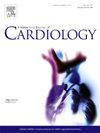Gender-specific effects of delay in cardiology consultation following primary care physician referral in atrial fibrillation patients: Impact on one-year outcomes
IF 3.2
2区 医学
Q2 CARDIAC & CARDIOVASCULAR SYSTEMS
引用次数: 0
Abstract
Background and objectives
Over the last two decades, reductions in cardiovascular (CV) and cerebrovascular events for patients with atrial fibrillation (AF) have been observed, but the non-cardiovascular rates have increased. Early initiation of oral anticoagulation helps reduce AF complications; however, the impact of delayed cardiology care after referral by a Primary Care Physician (PCP) is unknown. The aim of our study is to investigate the association between the elapsed time to cardiology care following a PCP referral and one-year outcomes among patients with AF and analyses gender-specific differences in these outcomes.
Methods
All PCP referrals with previous AF diagnoses to cardiology consultation from 2010 to 2021 (N = 15,224) were analysed. The outcomes analysed were all-cause, CV, and stroke mortality and hospitalizations rates at one-year. Cox regression adjusted for age, sex, diabetes mellitus, hypertension, atrial fibrillation, peripheral arterial disease, and stroke analysed the risk associated with elapsed time. Odds ratios and 95 % confidence interval (OR [95 % CI]) were calculated.
Results
Delay time from PCP referral to cardiology care was associated with an increase per day of delay in all-cause (0.25 %), CV (0.13 %), HF (0.11 %) and stroke (0.14 %) mortality rates. Multivariate analyses showed that elapsed time was associated with a higher risk of all-cause (1.005 [1.003–1.007]), CV-mortalities (1.006 [1.005–1.007]), all-cause (1.005 [1.003–1.006]), and CV-hospitalizations (1.009 [1.006–1.012]). Gender-specific analyses revealed that men had higher all-cause mortality (5.3 % vs. 4.0 %, p < 0.001), while women exhibited higher stroke mortality (2.7 % vs. 1.5 %, p = 0.005) and haemorrhagic mortality (4.7 % vs. 3.2 %, p = 0.012). AF complications also increased with the delay time: stroke (1007 [1001−1013]), and cerebral haemorrhage (1008 [1005-1011]).
Conclusions
Elapsed time for cardiology care was associated with an increase in AF complications (stroke and haemorrhage), all-cause, CV-related mortality and hospitalizations rates at one-year. Gender differences were evident, with women demonstrating higher stroke and haemorrhagic mortality rates despite similar delays in care. These findings underscore the need for gender-tailored risk stratification and timely cardiology care to optimise outcomes.
房颤患者初级保健医生转诊后心脏病学咨询延迟的性别特异性影响:对一年预后的影响
背景和目的:在过去的二十年中,观察到心房颤动(AF)患者的心血管(CV)和脑血管事件减少,但非心血管事件发生率增加。早期开始口服抗凝有助于减少房颤并发症;然而,由初级保健医生(PCP)转诊后延迟心脏病治疗的影响尚不清楚。本研究的目的是调查心房颤动患者在PCP转诊后接受心脏病治疗的时间与一年预后之间的关系,并分析这些预后的性别差异。方法:分析2010年至2021年所有经PCP转诊就诊的既往房颤患者(N = 15,224)。结果分析为全因、CV、卒中死亡率和一年内住院率。Cox回归校正了年龄、性别、糖尿病、高血压、心房颤动、外周动脉疾病和中风等因素,分析了与时间流逝相关的风险。计算比值比和95 %置信区间(OR[95 % CI])。结果:从PCP转诊到心脏病学护理的延迟时间与全因死亡率(0.25 %)、CV(0.13 %)、HF(0.11 %)和卒中(0.14 %)的延迟增加相关。多变量分析显示,时间流逝与全因(1.005[1.003-1.007])、cv死亡(1.006[1.005-1.007])、全因(1.005[1.003-1.006])和cv住院(1.009[1.006-1.012])的高风险相关。性别分析显示,男性的全因死亡率更高(5.3% % vs. 4.0% %,p )。结论:心脏病学治疗的时间与房颤并发症(中风和出血)、全因、cv相关死亡率和一年内住院率的增加有关。性别差异很明显,尽管在护理方面有类似的延误,但妇女的中风和出血性死亡率更高。这些发现强调了针对性别的风险分层和及时的心脏病学护理以优化结果的必要性。
本文章由计算机程序翻译,如有差异,请以英文原文为准。
求助全文
约1分钟内获得全文
求助全文
来源期刊

International journal of cardiology
医学-心血管系统
CiteScore
6.80
自引率
5.70%
发文量
758
审稿时长
44 days
期刊介绍:
The International Journal of Cardiology is devoted to cardiology in the broadest sense. Both basic research and clinical papers can be submitted. The journal serves the interest of both practicing clinicians and researchers.
In addition to original papers, we are launching a range of new manuscript types, including Consensus and Position Papers, Systematic Reviews, Meta-analyses, and Short communications. Case reports are no longer acceptable. Controversial techniques, issues on health policy and social medicine are discussed and serve as useful tools for encouraging debate.
 求助内容:
求助内容: 应助结果提醒方式:
应助结果提醒方式:


